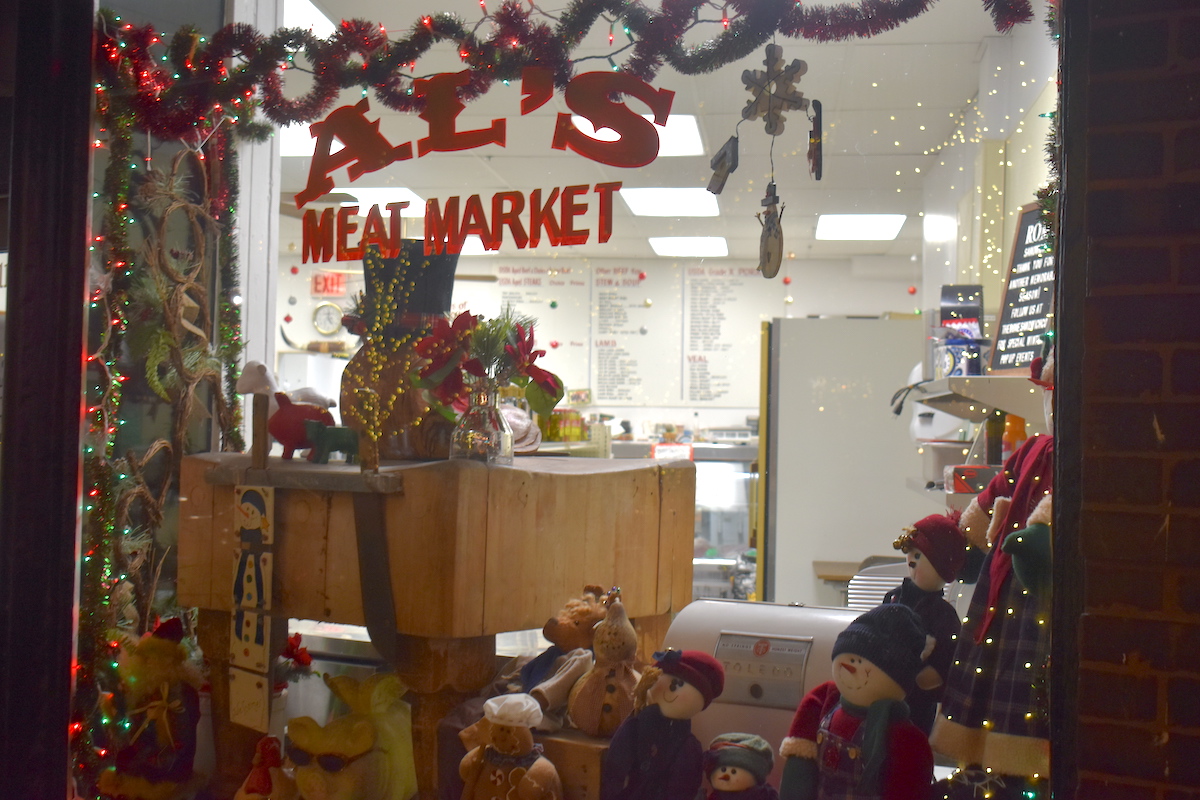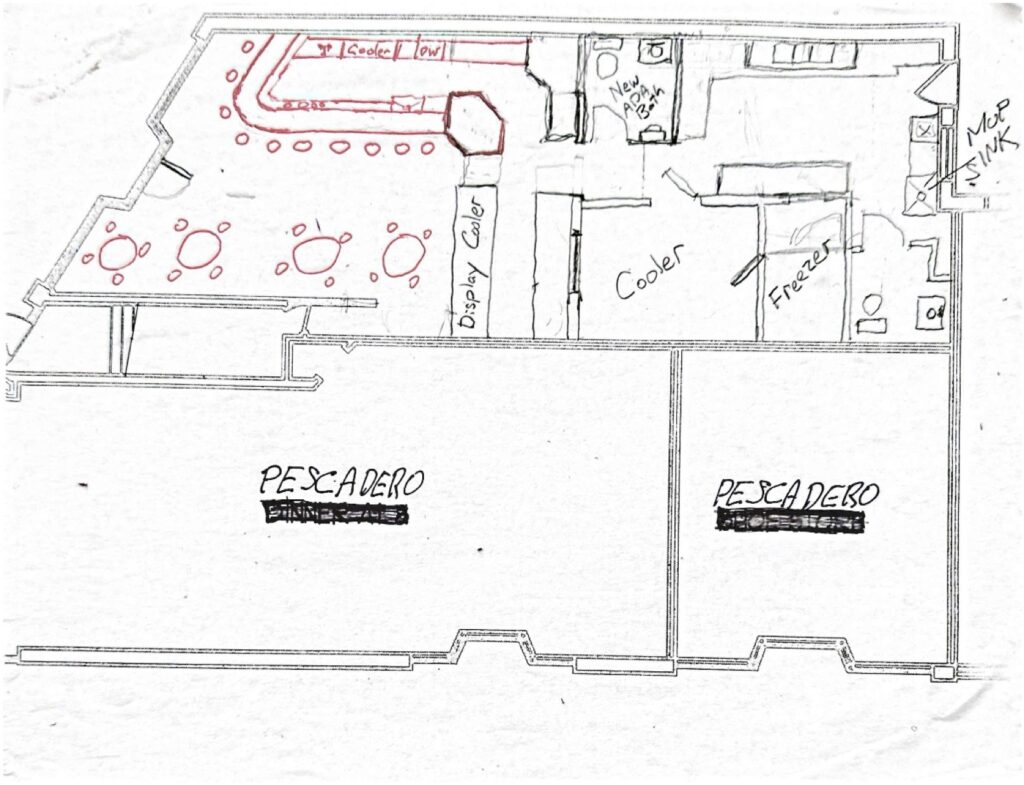
Marbled meat and whiskey neat? Wilmette trustees say it’s worth a shot
Proposal would turn Al’s Meat Market into a bar after-hours
A butcher walks into a bar. Actually, in this case, it’s the other way around, and it’s a new one for the Village of Wilmette.
During their meeting on Tuesday, Nov. 28, Wilmette trustees discussed a pitch from local entrepreneurs to turn Al’s Meat Market into a dual-threat business: a butcher shop by day and a bourbon bar by night.
The Village Board gave a favorable review to the concept and directed village staff to draft conditions for what would be a new class of liquor license. Trustees will review a draft of the ordinance at a January meeting, said Village Manager Mike Braiman.
The idea comes from Keith and Molly Veneziano and Mike Chookaszian, the latter of whom owns the building, 1165 Wilmette Ave., in which Al’s Meat Market has operated for more than 20 years. Chookaszian also is part-owner of a restaurant group that includes neighboring restaurants Pescadero and Napolita. The Venezianos own The R.O.M.E. Sandwich Company, a pop-up business that has run out of Al’s Meat Market for the past three summers.

The mixed-use concept for Al’s would reimagine the space, enabling a 9 a.m.-5 p.m., five-days-a-week butchery and evening-hours, seven-days-a-week bar. In the proposal, the petitioners are requesting a liquor license that allows for up to 75 percent liquor sales. The Village Board must approve a new classification of liquor license to make that happen.
Village Attorney Jeffrey Stein explained that every other Village liquor license that allows on-site alcohol consumption requires the licensee to earn no more than 50 percent of its sales from alcohol.
“This would be a first for Wilmette,” Stein said.
Chookaszian and the Venezianos told Wilmette trustees on Nov. 28 that Al’s Meat Market is struggling to survive, and they hope the new venture will give it, as well as downtown Wilmette, a shot of life.
Molly Veneziano said the group plans to revitalize the space by returning it “back to its original glory” with a higher, tin roof, wood flooring and more. According to preliminary plans for the business, a J-shaped bar and a few tables would dominate the front of the house, pushing some of the market’s display cases and shelving to the back room; however, the primary display case would remain on the east wall.
“We want to keep this community butcher shop and in order for this institution to remain, it needs to evolve,” she said. “And we believe it would benefit from the supplemental revenue a bar would offer.”
Al Spera opened Al’s Meat Market in Winnetka in the 1960s. The business was passed on to Al’s son Joe Spera, who moved the market to downtown Wilmette in 2001. Joe Spera still owns and operates Al’s Meat Market and is a community fixture along Wilmette Avenue.
Under a new arrangement, the Venezianos and Chookaszian would own the space, and Keith Veneziano said improvements would also be made to the butcher business, calling it a “tremendous opportunity to do a little better on that side.”

The three also believe the bar would be a welcome and unique addition to downtown Wilmette, an area that has become in recent years a nightitme destination in the area. They said the bar would be a complement to the surrounding restaurants.
“This is a way to save the butcher shop and do something Wilmette needs,” Chookaszian said. ” … I think it really fits with the restaurants in Wilmette.”
The bar’s hours would mimic those of surrounding restaurants with the ability to stay open until 11 p.m. on weekdays and 1 a.m. on Friday and Saturday nights.
Many details of the concept must be worked out, but plans for the spot include serving food. The applicants provided Wilmette with a sample small-bites menu with items such as charcuterie and cheese plates, dips, hush puppies and meatball sliders. It was also suggested that the bar could encourage patrons to order from local restaurants by placing menus and information on its tables.
The Village of Wilmette’s Judiciary Committee previously discussed the concept and brought it to the Village Board on Nov. 28. Committee member and Trustee Stephen Leonard expressed his support for the idea.
“I’m a big advocate for this,” he said. “It’s wonderful. I love the concept and love the team they put together.”
Most of Leonard’s board peers echoed his sentiment.
Trustee Gina Kennedy said she was on the fence. She wondered if there was a local demand for this type of business, pointing out that downtown Wilmette’s restaurant boom has added plenty of spots to grab a drink. Kennedy also wanted more data on public safety in the area.
Braiman and Stein responded that they spoke with the police department earlier that day and that in the past year, authorities fielded six nighttime calls near establishments able to serve alcohol until 1 a.m. in downtown Wilmette. Only two of those calls, Stein said, involved patrons of those establishments.
“There is not a demonstrated public safety issue with places serving alcohol until 1 a.m.,” Braiman said.
At the board’s request, Village staff will draft an ordinance to create a new liquor license that supports the butcher shop-bar concept, which will include conditions that the butcher shop must be open and operational during the day and the bar offer food. The liquor license would also only pertain to the downtown Wilmette business district.
Multiple trustees pointed out that the board’s eventual decision will set a precedent and could draw similar requests and cause the board to consider more unique liquor licenses.
Trustee Kate Gjaja welcomed the conversations and expressed interest in Wilmette reviewing its past liquor-related precedents and ordinances to see if they need updates to align with the times.
“We should understand the history of how we got to this point as a community,” she said. ” … I think there’s some interesting history to that that we should just be aware of so we just don’t blindly continue to have (mandatory food sales) as requirement. We may decide we want to, bu tI think it’s worth us understanding that.”
Like many New Trier Township communities, Wilmette was a dry town — not allowing the sale of alcohol — for decades following national Prohibition in the 1920s. That changed in 1974 — a decade before Winnetka (1982) and decades before Kenilworth (2017) — with a referendum to allow liquor sales in grocery stores and restaurants.
Alcohol-related regulations have evolved since; though, if trustees pass the Al’s Meat Market concept, it would be the first liquor license to allow for a primary sum of sales to be for alcohol.
Trustee Kathy Dodd, a member of the Judiciary Committee, said the interesting case is why the committee wanted to drive a discussion at the board level.
“We need to recognize that maybe this is moving us in the direction of a tavern and we can be open to that,” she said. “We shouldn’t be surprised if we do this … that we might get another request. The discussion to move forward is a good starting point.”
The Record is a nonprofit, nonpartisan community newsroom that relies on reader support to fuel its independent local journalism.
Become a member of The Record to fund responsible news coverage for your community.
Already a member? You can make a tax-deductible donation at any time.

Joe Coughlin
Joe Coughlin is a co-founder and the editor in chief of The Record. He leads investigative reporting and reports on anything else needed. Joe has been recognized for his investigative reporting and sports reporting, feature writing and photojournalism. Follow Joe on Twitter @joec2319


